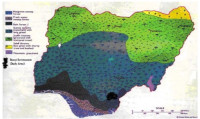Impact Of Meteorological Parameters On Rice Yield: An Approach For Environmental Resource Sustainability In Ebonyi Rice Farmland, Nigeria
Keywords:
Meteorological parameters, rice yield, environmental resource, sustainabilityAbstract
This survey considered the impact of meteorological parameter on rice yields, poverty reduction, environmental resource sustainability and management. Data were generated through the use of multiple linear regression and crosscorrelations analysis. Other tools include correlograms, histogram, and bar graphs. The correlation variable results indicated that the tonnage of rice yield over the years was a function of meteorological condition in the area. The consequences of continuous variation in meteorological condition were severe reduction and deterioration in annual tonnage of rice yield and environmental resource sustainability. In the light of the above, it then became expedient to promote agro-meteorological advisory services as well as promotion of best practices that are climate change resilient in rice production.
References
Adinna E. N. (2001). Environmental Hazards and Management. Enugu: Snap Press Ltd,.
Anika S. M. (2010). Climate Change: its Evidence in Nigeria, Mitigation, Adaptation and Disaster Risk Management Implications, paper presented at Centre for Environmental management and Control (CEMAC), University of Nigeria, Enugu Campus (during public lecture)
Anyadike R. N. C. (2009). Climate Change: Causes and Consequences, paper presented at Centre for Environmental Management and Control (CEMAC), University of Nigeria, Enugu Campus, (during public lecture).
Battisti R. and David S. (2009). Assessing risks of climate variability and climate change for Indonesian rice agriculture. Proceedings of the National Academy of Sciences of the United States of America No.19 (2007), 7752-7757
Bhalme, H. N. (1997). The Climate of Arid Zone and Crops, World Climate Programme, Application and Service. Indian Institute of Tropical Meteorological, Geneva.
Bhalme, H. N. (1998). The Role of Agro-meteorology in India Economy. World Climate Programme, Application and Service. Indian Institute of Tropical Meteorological, Geneva.
Blair, J. (2002). Rainfall Variability and Crops Yield. Scott Collins: National Science Foundation (NSF) Publication.
Central Bank of Nigeria (CBN, (2005). Annual survey, Abuja Nigeria. Ebonyi State Agricultural Development Programme (ESADP, 2009). onthly Weather Bulletin, Abakaliki.
Federal Office of Statistics (FOS, 2006). Annual Abstract of Statistics, Lagos Nigeria.
Fraser, E. (2008). Crop yield and climate change. http://www.Vulnerablefoodsystems.com
Holden, P. D. and Thompson, A. (1993). Economic Forecasting. London: Vitalis Publication
Hopkin, J. S. (1999). Impact of Climate on Agriculture. World Climate Programme, Application and Service, Geneva.
Knapp A., Fay P. and Blair J. (2008). Rainfall Variability Analysis. Scott Collins: National Science Foundation (NSF) Publication.
Lobell D. B., Burke M. B., Tebaldi C., Mastrandrea M. D., Falcon W. P., and Naylor R. L.(2008), Prioritizing climate change adaptation needs for food security in 2030. Science, 319 (5863), 607-10
National Household Survey Capability Program (NHSCP, 2000). National Annual Survey, Lagos Nigeria.
Nigeria Meteorological Service (NIMET, 2008). Annual weather Observation Record, Oshodi, Lagos.
Nigerian National Integrated Survey of Households (NNISH, 2001). National Annual Households Survey, Lagos Nigeria.
Ofomata, G. E. K. (1985). Soil Erosion in Nigeria: The View of Geomorphologies. Inaugural Lecture Services. No 7, University of Nigeria, Nsukka
Ogbuene, E. B. (2007). Relationship between Rainfall, Soil Temperature at Various Depth and Implication on Crops Yield. Unpublished M.Sc Dissertation, Enugu State University of Technology, Enugu.
Ogbuene E. B. (2009). The Role of Tourism Potentials in the Development of Environmental Resources in Ugbo Town, Awgu L.G.A. of Enugu State Nigeria. Unpublished M.Sc Seminar paper, Enugu State University of Technology, Enugu
Oguntoyinbo, J. S. (1981). Towards a Better Understanding of Drought Phenomena in West Africa. In Oguntoyinbo, J. S. et al (eds) Meteorological Hazards and Development. Lagos: NMS.
Rural Agricultural Sample Survey (RASS, 2000). National Annual Sample Survey, Lagos Nigeria.
SPSS (1990). SPSS/PC. Statistical 10.0 for the IBM Pc/Xt/At and PS/2. United State of America.
Tilman, D. 1999. The ecological consequences of changes in biodiversity: a search for general principles. Ecology, 80, 1455-1474
UNICEF (2007). The Nigerian Child, United Nations Children's Fund, Vol. 1, Issue 1.
Wilson, E.O. (1990). Engineering Hydrology. London: Macmillan press Ltd. World Meteorological Organization (2007). Impact of Climate on Agriculture. World Climate Programme, Application and Service, Geneva.
World Meteorological Organization (1999). Impact of Climate on Agriculture. World Climate Programme, Application and Service, Geneva.

